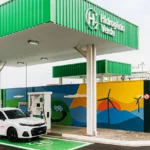In July 2025, Brazil concluded its BRICS presidency with a remarkable legacy: positioning the country as a protagonist in the global energy transition. Held in Rio de Janeiro, the meeting was marked by structuring discussions on decarbonization, energy innovation, and climate finance, reflecting a new environmental geopolitics that recognizes the strategic role of the Global South.
At the heart of the discussions was the urgency of accelerating the replacement of fossil fuels with clean sources, a challenge that requires not only technology and political will, but also capital, multilateral cooperation, and a commitment to social inclusion. Brazil, with a clean energy matrix of 88%, has become a symbol that this transition is possible and financially viable.
Energy transition as a lever for reindustrialization and economic security
The political consensus among the BRICS countries was formalized in a joint statement at the 10th Energy Ministerial Meeting in May of this year. In it, the ministers advocated for a "fair, inclusive, and financially viable energy transition," highlighting technologies such as green hydrogen, bioenergy, solar, and wind power. The BRICS Energy Research Cooperation Platform was also approved, which envisages technology development hubs, including in Brazil.
According to a study published by the BRICS Think Tank, the nations of the group have sufficient industrial capacity and natural resources to lead a green reindustrialization process, that is, to restructure their economies based on sustainable production chains, increasing global competitiveness and generating low-carbon jobs. For Brazil, this movement not only reduces dependence on fossil fuels but also positions the country as a strategic supplier of clean energy, green technologies, and critical inputs such as lithium and niobium.
ESG investment as a driver of the new energy economy
Brazil's leadership has also been reflected in the financial sector. The country was the first selected by the Climate Investment Funds (CIF) to receive resources for the decarbonization of heavy industries, such as steel, cement, and chemicals. At the same time, Brazilian funds and banks have already channeled billions into "green bonds," such as Itaú (R$1.4 billion in 2025), while the BNDES (Brazilian Development Bank) has accumulated R$133.8 billion invested in renewable energy between 2000 and 2020.
Global green restructuring requires US$1.3 trillion in climate investments by 2030, and Brazil is among the most competitive destinations for this capital. For COP30 (in November 2025, in Belém, Pará), the government is preparing to launch the Tropical Forests Forever Facility (TFFF), a US$125 billion fund that will reward countries for conserving tropical forests, adding environmental value to each hectare preserved.
The private sector is also reacting: companies like Iberdrola, Enel, and Engie are announcing billion-dollar investments in renewable energy, while multinationals are looking to Brazil as a clean energy hub with privileged logistical access to Latin America, Africa, and Europe.
Business without borders
The BRICS 2025 energy agenda revealed more than diplomatic commitments: it demonstrated that Brazil is ready to lead the next phase of the global green economy. And this is precisely where BRING Consulting operates, connecting governments, companies, and investors who see the country as a strategic platform for energy transition, innovation, and positive impact.
More than just observing the transformation, BRING actively participates in it, structuring international opportunities, promoting business rounds, and positioning Brazil at the decision-making centers of the new economy.
The transition has already begun. And BRING is where it happens.


